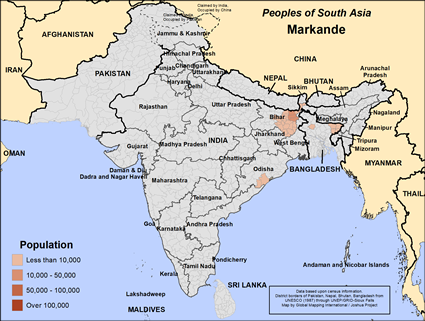The Markande people live in Bihar and Odisha. They are also called by the name of Muni. They speak Angika and Hindi and read and write in Devanagari.
The Markande are not landowners. They work as agricultural or general laborers. They are not well educated so the gospel will need to be given in oral form. Child marriages are common among the Markande. The bereaved and divorced can marry again. The dead are either cremated or buried. On the death of the father, sons inherit the property with the oldest son becoming the new head of the family. They have a caste council and elders to look after them. They eat meat, fish, and eggs as well as grains.
The Markande people practice Hinduism, the ancient religion of India. Hinduism is a catch-all phrase for the local religions of South Asia, so it is very diverse. At the popular level, Hindus worship and serve the gods of the Hindu pantheon. They visit Hindu temples and offer prayers, food, flowers, and incense to their gods in hopes of gaining protection and benefits. They do not have a personal or familial relationship with their gods like Christians or Jews. There are other Hindus who are much more philosophical, especially among the Brahmins.
The Markande people need a relationship with Jesus Christ so they can enjoy life to the full.
Pray that the council leaders and elders come to Jesus Christ and lead others to a movement to Christ. Pray that gospel recordings and the JESUS Film will become easily accessible to them. Pray for spiritual refreshment when they encounter Jesus Christ.
Scripture Prayers for the Markande in India.
| Profile Source: Keith Carey |











